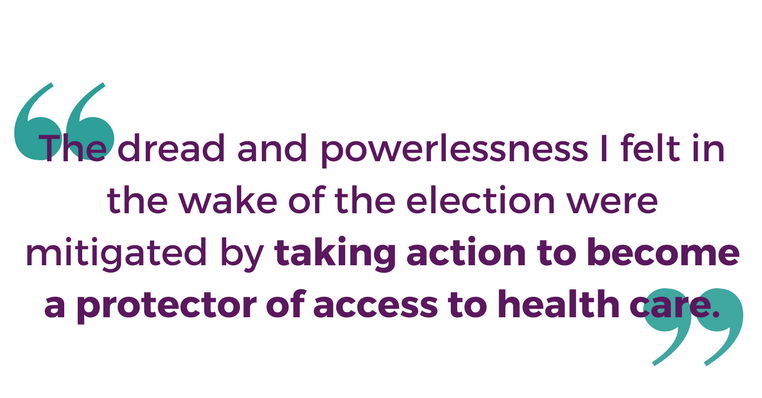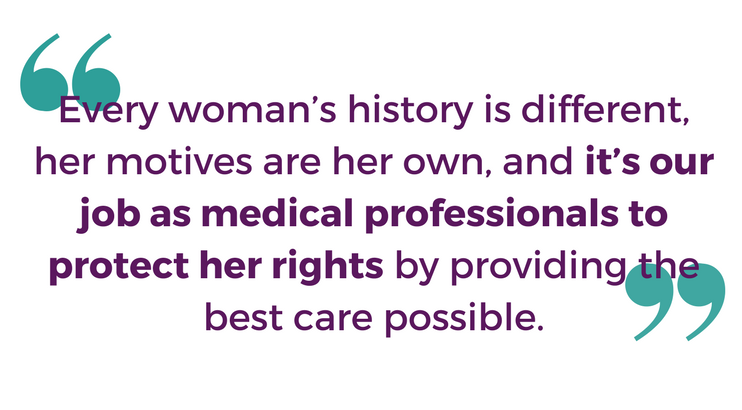Growing up in a liberal community in New Jersey, I considered comprehensive sex education unremarkable and reproductive services a part of primary care. During my work in health policy research and evaluation after college, I realized I had taken this perspective for granted. One of my most memorable experiences came in analyzing a national funding stream designed to reduce teenage pregnancy. In interviewing staff and participants across widely different programs and geographic regions, I gained an appreciation for the complexities of not just reproductive health provision but also reproductive autonomy.
When working with women to understand their experiences with family planning, I grappled with the personal ramifications of precarious access to comprehensive reproductive healthcare. I was faced with the realization that significant racial and gender privilege underpins our collective political value judgments, like the assertion that teenagers should not be pregnant or that parents should be able to provide for their families without government assistance. These experiences, and the primary care relationships I was lucky enough to observe, helped me to change paths and pursue clinical medicine after 5 years in policy research.
 Like most other first-year medical students, I found my life in the fall of 2016 consumed by studying, clinical time, exercises, and exams. Despite my years of working before starting school, I was having a hard time broadening my perspective beyond the next block or the next curricular exam. And then the presidential election happened, and everything changed. The results have been dissected endlessly and I won’t bore you with my post mortem, but suffice it to say it served as a wake-up call for me. All of a sudden, the steady social progress, increasing access to health care, and protection of reproductive rights that I had taken for granted over the past eight years was acutely jeopardized.
Like most other first-year medical students, I found my life in the fall of 2016 consumed by studying, clinical time, exercises, and exams. Despite my years of working before starting school, I was having a hard time broadening my perspective beyond the next block or the next curricular exam. And then the presidential election happened, and everything changed. The results have been dissected endlessly and I won’t bore you with my post mortem, but suffice it to say it served as a wake-up call for me. All of a sudden, the steady social progress, increasing access to health care, and protection of reproductive rights that I had taken for granted over the past eight years was acutely jeopardized.
The day after the election, I sat down to complete the Medical Students for Choice (MSFC) externship application that I had been putting off for weeks. The dread and powerlessness I felt in the wake of the election were mitigated by taking action to become a protector of access to health care. I worked with the wonderful staff at MSFC to apply to a comprehensive gynecological practice.
After months of anticipation, I began my externship just after the spring semester ended. I felt a little nervous going into it – I wasn’t sure how much I would be able to contribute after just one preclinical year – but I was excited. The first day, I arrived to the clinic finding the staff had posted fliers with highlights from my application around the office to introduce and welcome me. I felt completely at home.
My ability to work with patients, and to shadow doctors and nurses as they performed a range of gynecological care and abortion services, was unparalleled. As one doctor I worked with repeatedly joked with his patients, he was happy to have me shadow because someone needed to continue the work when he died. Although lighthearted, there was some truth to that: two of the clinic’s four physicians were retired from private practice, and continued to provide care at the clinic solely because they believed strongly in its mission. They were able to share stories about their experiences providing health care across a range of political environments, from the days before abortion was legalized to the ease of comprehensive women’s health in the immediate post-Roe environment to the steady onslaught of restrictions that, since the 1980s, came to complicate patient care.
 As a clinical extern, I saw patients from across every spectrum imaginable. In just two weeks, I consulted with women as young as 14 and as old as 47. Many were already mothers, and many were not. Situated in a culturally diverse area, the clinic might in one day see patients who speak 8 or 10 different languages and come from a variety of religious traditions. All of this was an incredibly useful primer in different cultural viewpoints on contraception and abortion, and on how to counsel patients so that they feel free to make the decisions they consider best given their beliefs and their circumstances. It’s easy to read a statistic that says one in three women will have an abortion during her lifetime, but working with patients every day really helps to solidify the diversity of experiences this number encompasses. Every woman’s history is different, her motives are her own, and it’s our job as medical professionals to protect her rights by providing the best care possible.
As a clinical extern, I saw patients from across every spectrum imaginable. In just two weeks, I consulted with women as young as 14 and as old as 47. Many were already mothers, and many were not. Situated in a culturally diverse area, the clinic might in one day see patients who speak 8 or 10 different languages and come from a variety of religious traditions. All of this was an incredibly useful primer in different cultural viewpoints on contraception and abortion, and on how to counsel patients so that they feel free to make the decisions they consider best given their beliefs and their circumstances. It’s easy to read a statistic that says one in three women will have an abortion during her lifetime, but working with patients every day really helps to solidify the diversity of experiences this number encompasses. Every woman’s history is different, her motives are her own, and it’s our job as medical professionals to protect her rights by providing the best care possible.
Beyond my incredible interaction with patients, the small clinical staff also made a lasting impression on me. Many were working hard to make ends meet for their own families, yet the atmosphere was friendly and collegial, with jokes flying back and forth between the staff. There was a serious undercurrent, though: shortly before I began my externship, the clinic came under threat when protesters set off small explosives in the elevator of the building.
It amazed me that the clinic staff didn’t consider their work particularly brave, but just a mundane part of providing services that their patients needed. At a staff debrief event after the explosives incident, the threat was discussed with some anger but, overwhelmingly, with a calm resolve to care for patients regardless of the circumstances. One staff member, barely out of college, remarked quietly, “I don’t think it would ever come to this, but I would give my life for this clinic.” The inspiration of working with amazing providers who focus on the importance of patient autonomy and great clinical care will follow me as I finish medical school and embark on my own career in medicine.
This post was written anonymously by a current medical student and MSFC member.